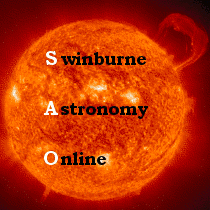Neutron
A neutron is a sub-atomic particle with no net electrostatic charge, with a very similar mass to a proton. Neutrons are thought to comprise of one up quark of charge +2/3 and two down quarks of charge -1/3 each, resulting in a net charge of zero. Neutrons are present in almost all atomic nuclei except for Hydrogen.
The mass of the neutron is: 1.6749286 × 10-27 kg.
When neutrons are isolated in space they decay with a half life of about 15 minutes and decay into a proton, an electron and an anti-neutrino. This process is known as beta decay, where beta refers to the electron. As a result of this process, space is relatively devoid of free neutrons.
Atoms with the same number of protons in the nucleus, but different numbers of neutrons are referred to as isotopes of the same element.
The neutron was discovered by Chadwick in the 1930s.
Study Astronomy Online at Swinburne University
All material is © Swinburne University of Technology except where indicated.

